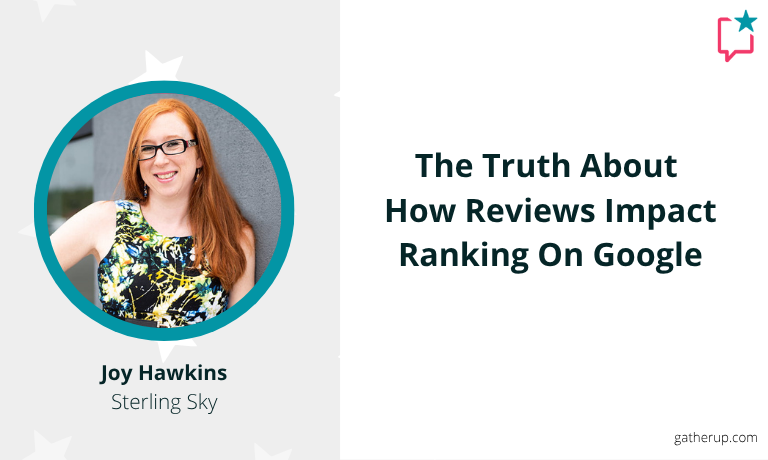
Review signals matter—but not always the way you think.
At AmpUp 2025, Joy Hawkins, founder of Sterling Sky and one of the most respected voices in Local SEO, delivered a clear, myth-busting session titled The Truth About How Reviews Impact Rankings on Google.
The session was exactly what you’d expect from Joy: grounded in testing, clear examples, and focused on separating real ranking factors from common misconceptions. If you’re advising clients on reputation strategy, or managing review acquisition in the trenches, here’s what Joy actually said and what it means for your agency.

Let’s Set the Record Straight: Reviews Are A Ranking Factor, Not The Ranking Factor
Early in her session, Joy clarified a foundational point:
“One of the ranking factors, not the only ranking factor.”
That’s the baseline. Google reviews contribute to how a business is ranked in local search and they operate in context alongside:
- Proximity
- Business category
- GBP optimization
- Website authority
- Engagement behavior
This matters because agencies often overpromise the power of reviews to fix broader SEO issues. Joy emphasized: reviews are part of the mix, not a magic lever.
Review Count and Recency Still Play a Role
While the transcript didn’t contain direct lines like “review count is a trust signal,” Joy did discuss how newer reviews help with visibility, especially when older reviews dominate a profile.
She discussed tests where adding recent reviews helped a business that had lots of outdated ones, reinforcing a clear takeaway: recency matters.
For agencies managing client accounts, this means:
- Stale profiles can drag performance
- A consistent review cadence is better than bursts
GatherUp can support this by automating timed review requests, ensuring businesses don’t go silent for months at a time.

Stop Chasing Perfect 5.0 Ratings
Joy didn’t directly talk about the difference between 4.5 and 5.0 stars, but she has elsewhere highlighted that perfect profiles aren’t always more persuasive. And in this session, she made a broader point:
“Consumers want to see how a business responds when things go wrong.”
That ties directly to how agencies should approach reputation management. Instead of aiming for spotless scores, aim for responsive, human behavior.

Keywords in Reviews: Not a Strategy, But a Signal
There was no specific confirmation from Joy in this session about keyword matches in reviews influencing rank. However, she did discuss how Google evaluates relevance by implying that reviews can support that signal if they reflect actual service context.
Practical tip: don’t script reviews, but encourage open-ended responses. Customers often use the exact phrases others will search for.
Review Responses Show the Business Is Engaged
Joy spent meaningful time here, noting that businesses who respond actively may perform better—not because responses are a ranking factor, but because engagement affects behavior.
“I think it’s really important to respond to all reviews, not just the good ones. It shows you’re paying attention.”
She added that the content of responses can also shape customer perception. Agencies should:
- Personalize responses
- Respond promptly
- Address concerns, not ignore them
Third-Party Reviews Don’t Help Rankings
While the exact quote from the blog (“Google doesn’t use third-party review volume…”) wasn’t present, Joy made this very clear:
“Google reviews are the only ones that impact rankings. Yelp, Facebook, they don’t move the needle for the local pack.”
This has huge implications for agencies still emphasizing those platforms in audits or strategies.
Spam Reviews Are Still a Problem
While Joy didn’t say “Fake reviews are rampant,” she did address spam:
“We still see lots of spam reviews. And unfortunately, Google’s not great at catching them.”
She explained the limitations of the current moderation system and suggested:
- Flagging strategically
- Documenting violations
- Focusing on boosting legitimate volume to offset outliers
This is exactly where platforms like GatherUp help, by systematizing real, defensible review generation.
Review Impact Varies by Industry
Joy made the point that review weight isn’t equal across all verticals. While she didn’t say “reviews can make or break visibility,” she did say:
“In legal and home services, reviews often matter more than in other verticals.”
This means agencies should:That mindset matters. Reviews are content, but more importantly, they build credibility. They’re not just about validation. They influence how customers engage and how businesses perform.
GatherUp supports every part of that process: requesting reviews, responding to them, and reporting outcomes. For agencies juggling multiple accounts, this is not a nice-to-have. It’s essential.
- Adjust review strategies based on vertical benchmarks
- Know when to push volume versus reputation nuance
Action Steps From the Field
To wrap her talk, Joy emphasized a few repeatable strategies that do work:
- Keep review requests consistent
- Personalize your response workflow
- Track new reviews in relation to changes in ranking
- Use reviews in content (but don’t fake them)

She reminded attendees:
“We’re not just building profiles. We’re building trust.”
That mindset matters. Reviews are content, but more importantly, they build credibility. They’re not just about validation. They influence how customers engage and how businesses perform.
GatherUp supports every part of that process: requesting reviews, responding to them, and reporting outcomes. For agencies juggling multiple accounts, this is not a nice-to-have. It’s essential.
Watch the full AmpUp session here
